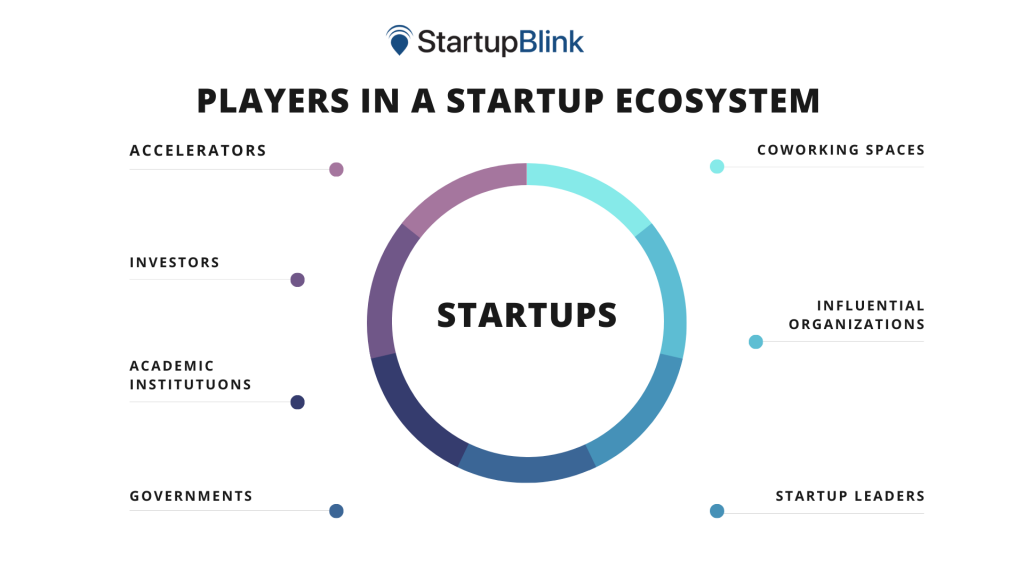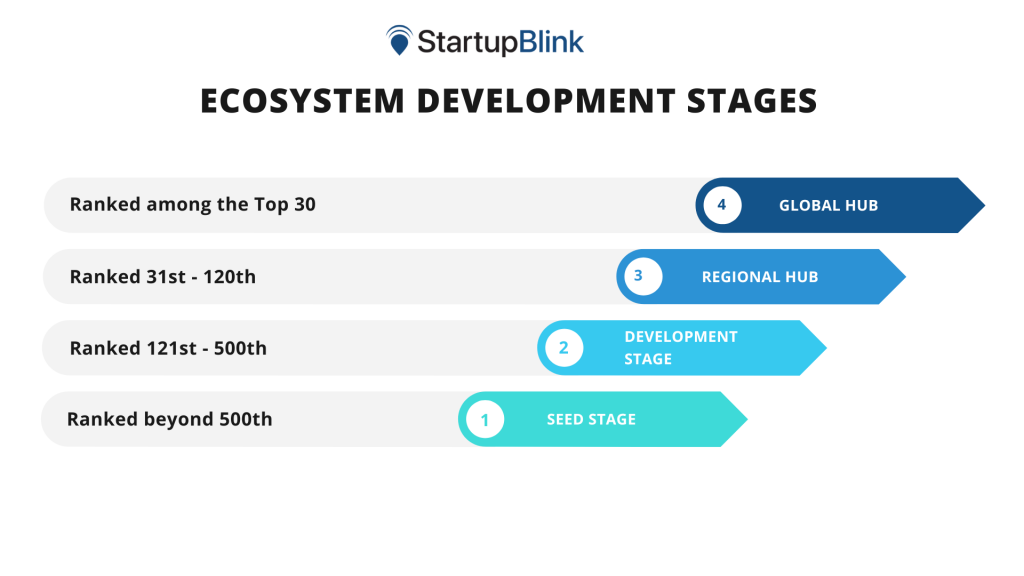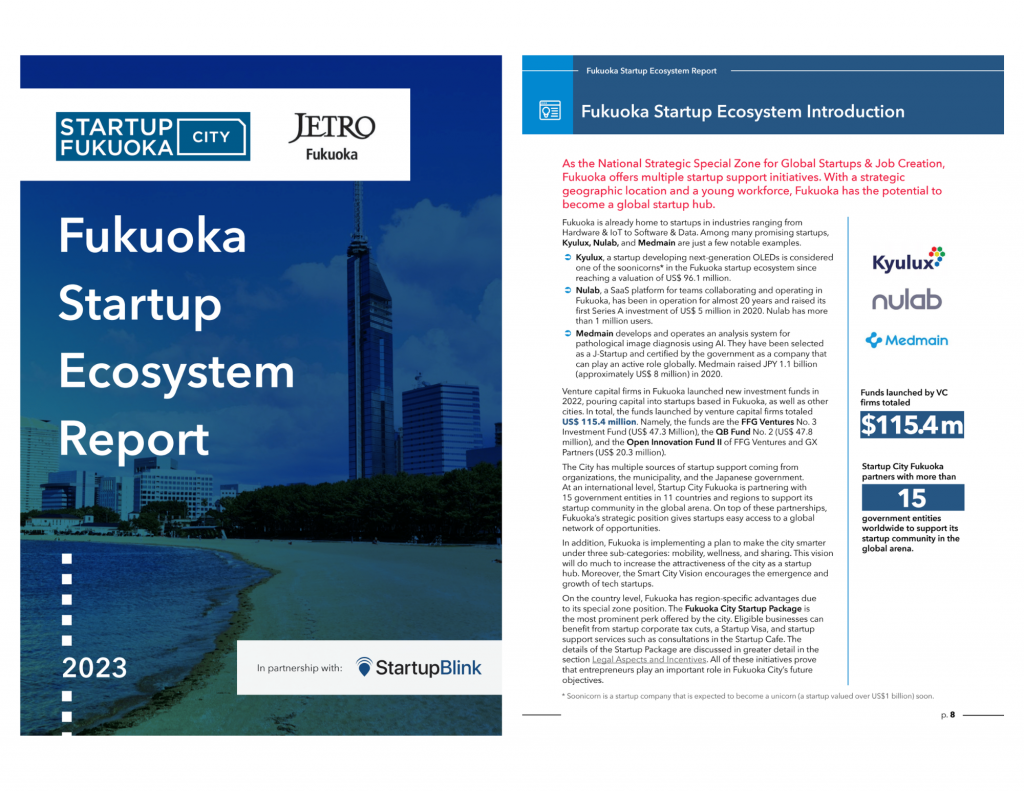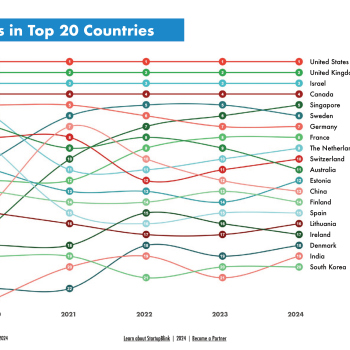Building a startup ecosystem is not an easy task, but if done successfully it can be of huge benefit to an economy at the local and national level for years to come. There is a good reason why local governments around the world have been increasing efforts to develop their startup ecosystems, in order to make it an integral part of their wider economic development plans. At StartupBlink, we attempt to understand the impact of these ecosystems and global trends through our global map of startup ecosystems, detailing some of the best startup hubs in the world.
Before we dive deeper, what is a Startup Ecosystem?
A startup ecosystem is a network of interconnected entities, organizations, and resources that support the growth, development, and success of startups within a specific geographic location. The startup ecosystems typically include a variety of stakeholders, such as startups themselves, investors, accelerators, incubators, educational institutions, government organizations, corporates, and more.
Based on our, startup ecosystem rankings that consider over 40 parameters, the top 5 startup ecosystems in the world for startups are:
- San Francisco, United States
- New York, United States
- London, United States
- Los Angeles, United States
- Boston, United States
Players of a Startup Ecosystem
Startups are the central entities in the ecosystem and the very reason it exists. Some of the key players listed below revolve around startups, each with its distinct roles and responsibilities:

- Coworking Spaces are shared working environments that provide startups a collaborative space to work, share ideas, and build a sense of community, fostering creativity and productivity.
- Accelerators are programs or organizations that offer mentorship, funding, and resources to startups, accelerating their growth and helping them achieve their potential quickly.
- Investors are individuals or entities that provide capital to startups in exchange for equity or ownership, fueling the startups’ operations, growth, and scalability.
- Startup Leaders are visionaries and experienced individuals who lead and guide startups, providing strategic direction and making critical decisions to ensure success.
- Influential Organizations are referred to as the Startup Pantheon in StartupBlink’s Global Startup Ecosystem. These organizations are massively valued and globally influential entities within the startup ecosystem that shape trends, policies, and the overall direction of the startup community.
- Academic institutions nurture talent, foster innovation, and provide vital resources like education, research facilities, and mentorship. They act as breeding grounds for aspiring entrepreneurs, fostering a conducive environment for learning, ideation, and growth.
- Government Organizations shape startup ecosystems through policies, regulations, and initiatives. They offer incentives, grants, and a supportive framework to boost startups, encouraging innovation and entrepreneurship. Government support drives economic growth, fosters innovation, and creates employment opportunities.
- Other Supporting Organizations are entities such as incubators, industry associations, innovation hubs and more, providing additional support and resources to startups, contributing to their success and sustainability.
Stages in Building a Startup Ecosystem

1. Seed Startup Ecosystem:
In this initial stage, the ecosystem has yet to produce impactful startups, but there is a burgeoning seed of startup activity. It is characterized by basic innovation infrastructure with a few coworking spaces and minimal accelerator activity, primarily supported by the public sector. Startups may begin within the city, but those aiming to scale usually migrate to larger hubs. Government involvement is crucial at this stage, as the ecosystem is not yet capable of generating a sufficient return on investment. Typically, this stage ranks between 501st – 1000 in the StartupBlink Global Startup Ecosystem Index.
2. Developing Startup Ecosystem:
At this stage, the ecosystem displays enhanced components compared to the seed stage. It encompasses a burgeoning community of startup founders and stakeholders, increased awareness of startups in the population, and more substantial public sector support for innovators. There are a few coworking spaces and accelerators with blended funding from the private and public sectors. This stage usually ranks between 121st to 500th in the StartupBlink Global Startup Ecosystem Index.
3. Regional Hub:
In the regional hub stage, the ecosystem boasts a well-developed community of founders who frequently create high-quality startups. These hubs are cities that allow startups to scale their products and services across a broader economic region or have a global mindset. They often have unicorn candidates or unicorns, making them attractive to immigrating entrepreneurs. Typically ranked between 31st to 120th in the StartupBlink Global Startup Ecosystem Index, these hubs are globally recognized as innovation powerhouses, producing unicorn candidates each year and substantial exits (more than 1 Billion USD$). They are usually international and multicultural cities that attract many foreign entrepreneurs.
4. Global Hub:
The pinnacle stage of an ecosystem, the global hub, represents a community of founders and startups with significant international recognition. These ecosystems consistently produce unicorn candidates and have a track record of achieving unicorn status and substantial exits (more than 1 Billion USD$). They are highly attractive to international entrepreneurs and are ranked between 1st to 30th in the StartupBlink Global Startup Ecosystem Index. These cities are known as innovation powerhouses on a global scale and thrive as international, multicultural hubs that draw entrepreneurs from around the world.
Strategies to Build a Startup Ecosystem
1. Evaluate the data of your ecosystem:
To develop your ecosystem, it’s crucial to understand its current position. We provide comprehensive data sets for 1,000 cities and 100 countries through StartupBlink PRO, aiding you in comprehending ecosystem performance across numerous parameters and industries. Alternatively, you can create a dedicated database for your ecosystem, facilitating the mapping of startups and other related entities. Startup Ecosystem Portals is an example of an interactive startup ecosystem database.
2. Provide a Startup-Business Friendly Environment:
National and local governments would be wise to formulate more startup-friendly policies. This includes various aspects like reducing taxes for startups, offering incentives, streamlining the registration process, and implementing startup visas for international entrepreneurs. StartupBlink’s Startup-Business Friendliness Index ranks 100 countries based on their ability to foster a conducive environment for startups.
Local governments often proceed with caution in their actions, a prudent approach for the most part considering their entire ecosystem is at stake. However, inaction and excessive bureaucracy can silently undermine these ecosystems.
3. Ensure the ecosystem has hubs for networking
For a startup ecosystem to grow, the presence of startup hubs, even at a micro level, is imperative. These hubs encompass coworking chains, accelerators, and startup conferences, fostering an environment where the startup community can collaborate and prosper.
Engagement with the community is a potent strategy as it offers an opportunity not only to market the startup’s product or service but also to discover additional resources that can aid in the startup’s growth. This may involve finding mentors, attracting investors, forming partnerships, or simply learning from fellow startup founders.
Moreover, beyond supporting the local startup community, there are notable examples that play a role in the global startup ecosystem. Slush, for instance, connects stakeholders of startup ecosystems globally in Helsinki, while Y Combinator, with its global alumni network, serves as a prominent accelerator.
4. Boost the investment ecosystem:
Funding is crucial for early-stage startup ecosystems to sustain and operate effectively. In the absence of a substantial number of investors during the early stages, the government may need to step in and fill that void. This becomes particularly vital during times of crisis, such as the ongoing pandemic, when running a startup is exceptionally challenging. During these challenging times, startup ecosystem developers must support startup founders.
However, as the ecosystem matures, private sector involvement in funding startups is preferred. The government’s role should shift towards encouraging the private sector to invest in startups once the ecosystem has reached a certain level of maturity.
5. Promote your ecosystem:
It is important to try your best to let the world know what makes your startup ecosystem special. This includes the talent or human resources your ecosystem has,what they are good at and what special projects they have done. Or it could include the universities in your city, what they specialize in – whether business, R&D or any other vertical. Lastly, let the world know of the ecosystem’s achievements, which may include startups in your city winning startup competitions or hackathons, or gaining impressive funding rounds.
For instance, as part of our ecosystem development services, we partnered with entities such as Startup City Fukuoka, ACCIO, Taiwan Tech Arena and KPMG to showcase the opportunities and resources within their startup ecosystem through unique ecosystem reports. The creation of such reports serves as a one-stop shop for entrepreneurs and investors interested in relocating or establishing a business overseas.
Boosting a startup ecosystem is good news for both the private and public sectors. The best startups in an ecosystem, which grow into unicorns most likely come from a global startup hub, like Open AI from San Francisco, USA, or from Barcelona, Spain. This helps the public sector in economic growth due to job generation and taxes and it helps the private sector by attracting more investors, high-quality talent and clients, a good knowledge base, and developing a good entrepreneurial culture.
What to do next?
If you’re a government organization seeking to contribute to the success of an ecosystem, our Ecosystem Development Services provide the insights and strategies you need. Let’s collaborate to uncover the true potential of your ecosystem, driving growth, innovation, and a brighter future.











